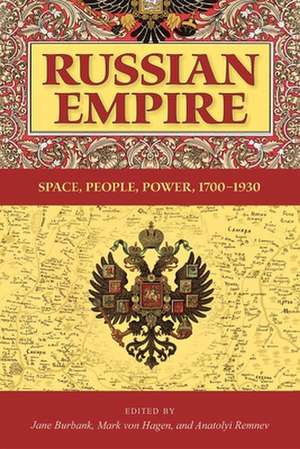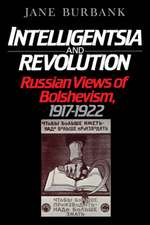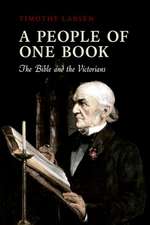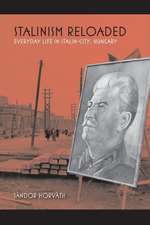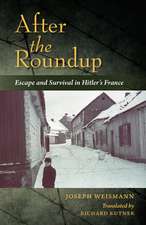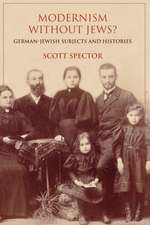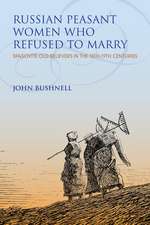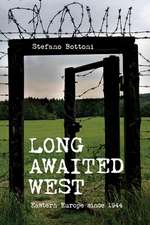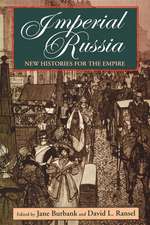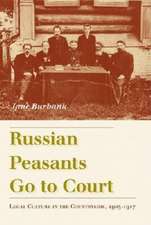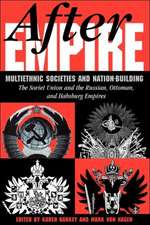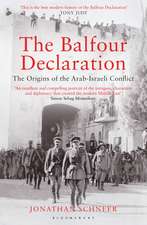Russian Empire – Space, People, Power, 1700–1930
Autor Jane Burbank, Mark Von Hagenen Limba Engleză Paperback – 7 aug 2007
Preț: 220.36 lei
Nou
Puncte Express: 331
Preț estimativ în valută:
42.17€ • 43.86$ • 34.81£
42.17€ • 43.86$ • 34.81£
Carte disponibilă
Livrare economică 24 martie-07 aprilie
Livrare express 08-14 martie pentru 44.24 lei
Preluare comenzi: 021 569.72.76
Specificații
ISBN-13: 9780253219114
ISBN-10: 0253219116
Pagini: 560
Ilustrații: 13
Dimensiuni: 155 x 233 x 33 mm
Greutate: 0.78 kg
Editura: MH – Indiana University Press
Locul publicării:United States
ISBN-10: 0253219116
Pagini: 560
Ilustrații: 13
Dimensiuni: 155 x 233 x 33 mm
Greutate: 0.78 kg
Editura: MH – Indiana University Press
Locul publicării:United States
Cuprins
Coming into the Territory: Uncertainty and Empire Jane Burbank & Mark von HagenPart I: Space 1. Imperial Space: Territorial Thought and Practice in the Eighteenth Century Willard Sunderland; 2. The "Great Circle" of Interior Russia: Representations of the Imperial Center in the Nineteenth and Early Twentieth Centuries Leonid Gorizontov; 3. How Bashkiria Became Part of European Russia, 1762-1881 Charles Steinwedel; 4. Mapping the Empire's Economic Regions from the Nineteenth to the Early Twentieth Century Nailya Tagirova; 5. State and Evolution: Ethnographic Knowledge, Economic Expediency, and the Making of the USSR, 1917-1924 Francine HirschPart II: People 6. Changing Conceptions of Difference, Assimilation, and Faith in the Volga-Kama Region, 1740-1870 Paul Werth; 7. Thinking Like an Empire: Estate, Law and Rights in the Early Twentieth Century Jane Burbank; 8. From Region to Nation: The Don Cossacks 1870-1920 Shane O'Rourke; 9. Bandits and the State: Designing a "Traditional" Culture of Violence in the Russian Caucasus Vladimir Bobrovnikov; 10. Representing "Primitive Communists": Ethnographic and Political Authority in Early Soviet Siberia Nikolai Ssorin-ChaikovPart III: Institutions 11. From the Zloty to the Ruble: The Kingdom of Poland in the Monetary Politics of the Russian Empire Ekaterina Pravilova; 12. The Muslim Question in Late Imperial Russia Elena Campbell; 13. The Zemstvo Reform, the Cossacks, and Administrative Policy on the Don, 1864-1882 Aleksei Volvenko; 14. Peoples, Regions, and Electoral Politics: The State Dumas and the Constitution of New National Elites Rustem Tsiunchuk; 15. The Provisional Government and Finland: Russian Democracy and Finnish Nationalism in Search of Peaceful Coexistence Irina NovikovaPart IV. Designs 16. Siberia and the Russian Far East in the Imperial Geography of Power Anatolyi Remnev; 17. Imperial Political Culture and Modernization in the Second Half of the Nineteenth Century Sviatoslav Kaspe; 18. Federalisms and Pan-movements: Re-imagining Empire Mark von Hagen
Recenzii
"Eighteen articles, mainly by US, Russian, and British scholars, cover various aspects of the Russian Empire from its foundation under Peter the Great to the rule of Stalin. The Russian participants, mostly historians and political scientists, come from the two Russian capitals and various other cities. The major focus is the geographies of rule in Russia. . . . The materials are derived in large part from Russian archives, especially those in Moscow. Several good maps aid readers' comprehension. . . . Recommended." ChoiceRussian Empire offers much valuable information on a wide range of significant issues . . . Genuinely thoughtful and thought-provoking. Dominic Lieven
Notă biografică
Descriere
Presents a new conception of the Russian empire, growing out of the multiplicity of its peoples, spaces, and principles of governance.
